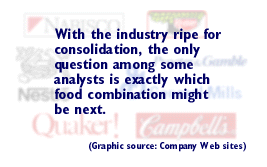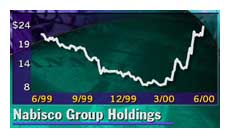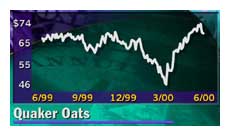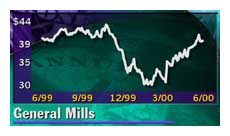|
Food fights on Wall St.
|
 |
June 8, 2000: 6:09 a.m. ET
With Unilever-Bestfoods in the works, investors salivate over the next big deal
By Staff Writer Tom Johnson
|
NEW YORK (CNNfn) - Flowers Industries Chairman and CEO Amos McMullin sounded a bit like a man entering a lion's pit a few weeks ago when he started a company conference call by throwing the floor open for advice on how to bolster his baked goods company's sagging stock price.
What followed was a relentless barrage of suggestions from analysts and investors, almost all of which recommended either selling or spinning off the company's main subsidiary, Keebler Foods Co. The hour-long phone call highlighted perfectly Wall Street's new aggressive mentality when it comes to a food industry that hasn't tickled investors' taste buds for years.
For months, analysts have predicted that a single big deal could spark a new wave of consolidation among food manufacturers. On Tuesday, that trigger emerged in the form of Unilever PLC's $20.3 billion acquisition of Bestfoods. The only question now, in the eyes of many, is just who will be next.
"This is the first of several to come," predicted Alice Ritcher, national industry director of KPMG's Food & Beverage unit. "It needed to be a deal like this. It had to be something that sort of grabbed the industry."
 The much-rumored deal between Unilever and Bestfoods did indeed serve notice that the once staid food industry is now ripe for consolidation. The much-rumored deal between Unilever and Bestfoods did indeed serve notice that the once staid food industry is now ripe for consolidation.
The deal puts immediate pressure on Unilever's top competitors, such as Nestle SA, currently the world's largest food company and Procter & Gamble (PG: Research, Estimates), the world's largest maker of household products, to re-examine their business lines in the face of Unilever's new product lineup.
But analysts said investors looking to ride the consolidation wave should look a little further down the food chain at companies such as Quaker Oats (OAT: Research, Estimates), General Mills (GIS: Research, Estimates) and Nabisco Group Holdings (NGH: Research, Estimates), which are likely to prove healthy spot acquisitions for companies looking to build market share and their bottom line.
A full plate of possibilities
The possibilities tossed about by analysts are endless: Philip Morris (MO: Research, Estimates) buying Nabisco, Nestle purchasing General Mills, any number of companies purchasing Keebler (KBL: Research, Estimates).
The most obvious acquisition candidate at this point is Nabisco, which has all but put out the 'For Sale' sign at the behest of top shareholder Carl Icahn. The maker of Ritz crackers, Oreo cookies and Milk-Bone dog biscuits already has attracted interest from French food conglomerate Group Danone, U.K. soft drink company Cadbury-Schweppes and Icahn himself about acquiring all or part of Nabisco's expansive holdings.
Nabisco, whose sole business is holding a majority stake in Nabisco Holdings Corp. (NA: Research, Estimates), is hardly a willing seller. Its cookies and cracker division remains among the industry's most coveted, and while sales slowed slightly last year, the company still was able to reverse a net loss from 1998.
 But much like Bestfoods, Nabisco was forced onto the market by disenchanted investors, who abandoned so-called "old economy" stocks in favor of technology and Internet shares with higher growth prospects but little in the way of earnings. But much like Bestfoods, Nabisco was forced onto the market by disenchanted investors, who abandoned so-called "old economy" stocks in favor of technology and Internet shares with higher growth prospects but little in the way of earnings.
That trend not only frustrated food industry executives, it brought loud protests from shareholders and fueled merger speculation -- as was the case with Flowers Industries.
"When you have disappointment, you're going to get criticism," McMullin said. "From criticism you get second-guessing and from second-guessing you get speculation, and I know it's out there and I understand it. Surely everyone who has an investment in Flowers Industries is interested and all want to see the value of [the stock] go up."
In Bestfoods' case, a more than 40 percent drop in its share price from November to March left it exposed to the kind of takeover bid Unilever offered.
Analysts largely hailed the $73 per share buyout Bestfoods garnered from Unilever because it represented a more than 44 percent premium above what the company's stock was trading before Unilever's overtures became public. But in truth it only represented about a 20 percent premium beyond what Bestfoods shares were trading just six months earlier.
 Other companies were equally exposed -- but some analysts now question whether the market's zeal to predict the next great deal might ultimately stifle several potential mergers by making them too expensive. Other companies were equally exposed -- but some analysts now question whether the market's zeal to predict the next great deal might ultimately stifle several potential mergers by making them too expensive.
"I don't really think we'll see" the wave of consolidation, said William Leach, a food industry analyst with Donaldson Lufkin Jenrette. "There are not that many companies that can afford these kind of mergers."
For example, Quaker Oats, the Chicago-based company best known for its hot and cold cereals, but whose most valuable asset is the popular sports drink Gatorade, traded as low as 45-13/16 in March.
The company's stock has shot up 58 percent since that time, including a nearly 5 percent gain Wednesday, as investors salivated over potential merger possibilities. One possibility is Nestle, which boasts complimentary food businesses, but could use the boost Quaker Oats' drink business would provide.
 The other likely target for Nestle would be General Mills, which already jointly markets cereal with Nestle in Europe under the Cereal Partners Worldwide Venture. But General Mills' stock, which just four months ago traded below $30 per share, has climbed more than 35 percent since that time. The other likely target for Nestle would be General Mills, which already jointly markets cereal with Nestle in Europe under the Cereal Partners Worldwide Venture. But General Mills' stock, which just four months ago traded below $30 per share, has climbed more than 35 percent since that time.
"The wild card here is Nestle because they are the largest global food company," said John O'Neil, a food industry analyst with PaineWebber. "They have to decide whether they want to participate."
Ultimately, analysts said what deals do occur will primarily be large companies purchasing small or mid-size firms that feature little product overlap and can immediately contribute to the company's bottom line. Otherwise, the acquiring firms will have a hard time selling such expensive deals to shareholders.
That could mean continued tough times ahead for troubled companies such as Campbell Soup Co. (CPB: Research, Estimates), which is struggling to boost its tepid soup sales.
The company's stock price, which was wallowing near its 52-week low until last week's speculation that a deal with Bestfoods might be in the works, makes it an attractive acquisition target. But Campbell's financial instability might keep others away.
"Companies that are struggling . . . have got two choices: They are going to be purchased for a rock bottom price and disappear, or they are going to get their act together and hire management willing to take some chances," KPMG's Richter said. 
|
|
|
|
|
 |

|

